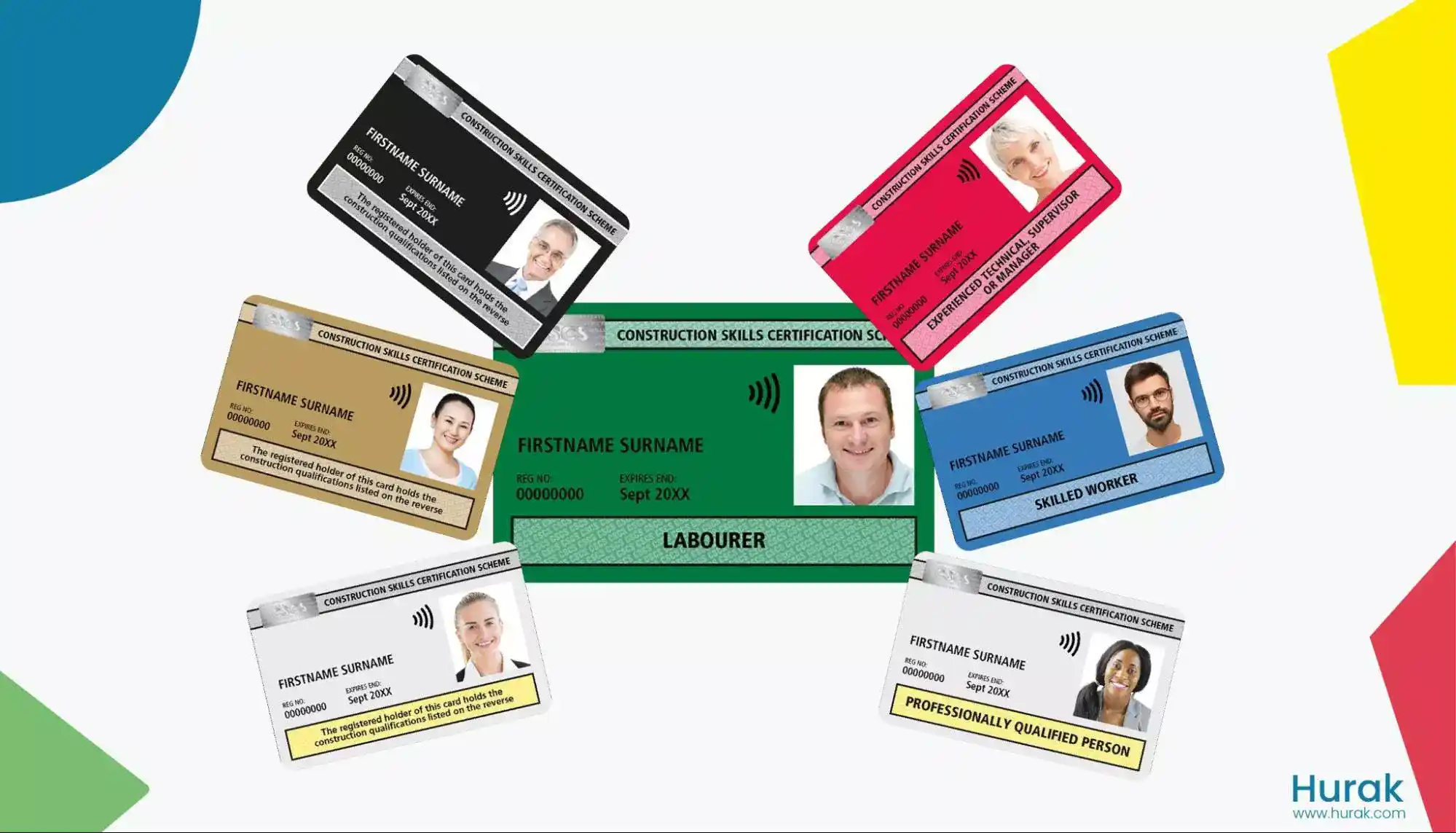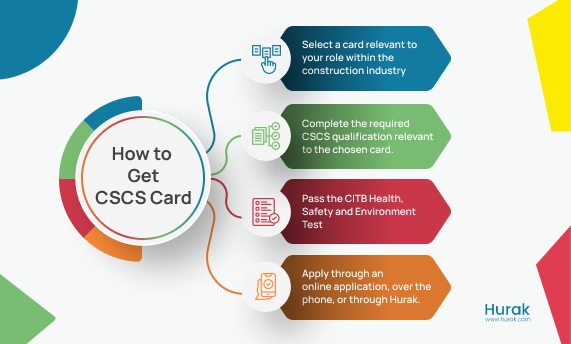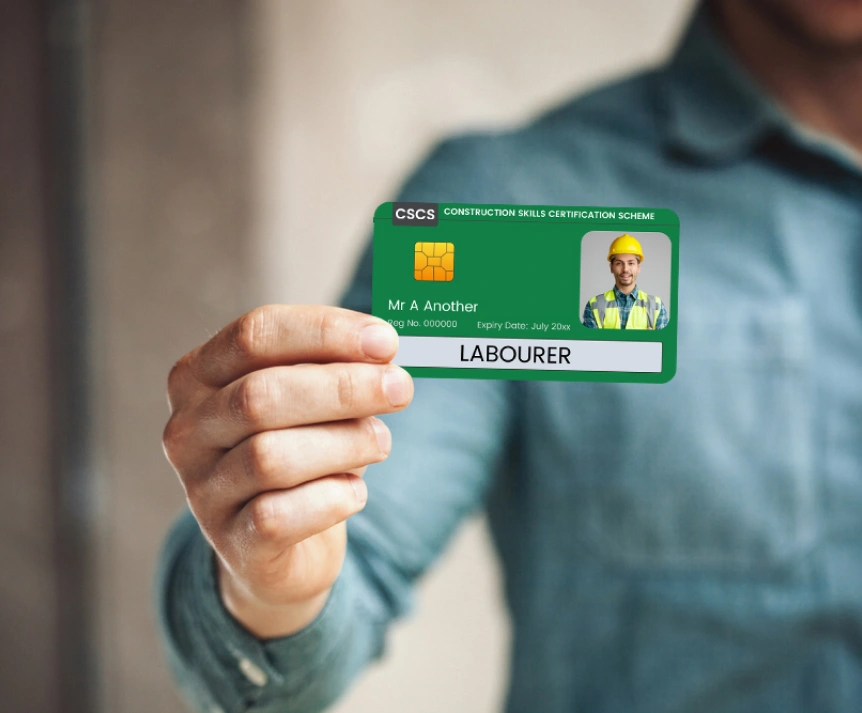
If you work in construction or related industries in the UK, you’ve probably heard of the CSCS card. However, it can all seem overwhelming at first with so many different types and application processes. This blog will provide all the information about this highly in-demand card.
What is a CSCS Card?
A CSCS card is issued by the Construction Skills Certification Scheme (CSCS) and is considered a valuable asset for anyone working within the construction industry. It demonstrates the holder’s commitment to safety and professionalism.
It proves that the holder has gained the knowledge, qualifications, and training to perform their role on the construction site safely and efficiently.
What is CSCS?
The Construction Skills Certification Scheme (CSCS) is a widely recognised certification scheme within the UK’s construction industry. It aims to ensure that all workers have the appropriate qualifications, skills, and knowledge to do their jobs safely on construction sites.
CSCS also issues different types of CSCS cards, widely acknowledged across the UK construction industry. Contractors or employers commonly require these cards when hiring workers for construction projects.
Is a CSCS Card a Legal Requirement?
A CSCS card is not a legal requirement for employees to gain access to construction sites. However, major contractors are increasingly making it a common requirement, as it proves their proficiency as construction workers.
That’s why it’s often listed as a key requirement in construction-related job advertisements.
If you intend to work in the construction industry, having a CSCS card is beneficial, as it will improve your job prospects.
Why is a CSCS Card Important?
As the construction industry has become more regulated, many contractors and employers require employees to hold a CSCS card. It helps enhance your professional profile, making you more eligible for a job. With this card, you may have unlimited job opportunities available.
Furthermore, a CSCS card is designed to promote safety on construction sites. It helps employers ensure that every worker on the site has gained knowledge and training in health and safety.
Types of CSCS Cards
There are numerous types of CSCS cards, each designed to certify different skill levels and competence in the construction industry. Each card represents a specific occupation or role within the construction sector. These roles can vary from labourers and apprentices to supervisors and managers.
The type of card you should get depends greatly on your job role and level of experience.
CSCS Green Card
A CSCS green card is specifically for those working in labouring occupations within the construction industry, such as general labourers, bricklayers, cleaners, carpenters, and plumbers. You must complete a CSCS Green Card Course for Labourers to get this card.

CSCS Red Card
A CSCS red card is a temporary card assigned to a construction site worker. Each Red Card has a different validity ranging from 6 months to 5 years. With this card, you can start working on-site while working towards getting a skilled CSCS card.
CSCS Blue Card
The CSCS blue card is specifically for construction workers who are experts in skilled work such as insulation, roofing, road building, etc.
CSCS Gold Card
The CSCS gold card is an advanced-level card intended for Advanced Crafts and supervisors within the construction industry. This CSCS Card is designed for experienced professionals to acknowledge their ability to supervise construction personnel.
CSCS Black Card
The CSCS black card is for experienced professionals indicating that the cardholder has gained the knowledge, skills, capability, and experience to manage high-level tasks in a construction environment.
CSCS White Card
The CSCS white card is the highest level among all the CSCS Cards. There are two types of white CSCS cards: one for the Academically Qualified Person and the other for the Professionally Qualified Person.
How to get a CSCS Card?
Getting a CSCS card is a simple process. Check out the following steps.
Step 1: Select a Card Relevant to Your Role
Select a card relevant to your role within the construction industry. Use the card finder to discover the card best suited for your role.
Step 2: Complete the Required Qualification
Complete the required CSCS qualification corresponding to the chosen card. For example, if you want to get a Labourer Card, you must complete a CSCS green card course.
Step 3: Pass the CITB Health, Safety and Environment Test
The next step is to pass the relevant CITB Health, Safety and Environment (HSE) test.
Step 4: Apply for the Card
Applying for the card is simple. You can apply through an online application, over the phone, or through Hurak.
Your card will be sent to you by post. It’s important to note that CSCS does not accept postal applications anymore.

CSCS Card Requirements
Different CSCS cards have different requirements. However, some common requirements are:
- Getting the required training.
- Passing the CITB HS&E Test.
- Relevant experience
Several steps are necessary to get a CSCS card. Firstly, it’s essential to undergo training to acquire the knowledge and skills required for your desired card, which can be accomplished by taking a suitable course for the desired card.
Another requirement is to pass the CITB Health, Safety, and Environment Test. Furthermore, relevant qualifications and experience are necessary to get your desired card. For instance, getting a CSCS blue card requires an apprenticeship and an SVQ/NVQ qualification.
Price of CSCS Card
The price of a CSCS card is £36 for all types. However, before applying for the card, you must pay extra for the required qualifications and the CITB test.
What CSCS Card Do I Need?
There are many CSCS cards, each represented by a different colour, such as green, red, blue, black, gold, and white, making it difficult to find the right one. However, using a tool like a CSCS card finder can be useful.
How Long Does It Take To Get a CSCS Card?
When your application has been approved, your CSCS card will be posted to you the next working day. Most cards arrive at their requested destination within 3-5 days of application approval. If your card does not arrive within ten days, please contact CSCS.
The processing time for a CSCS card depends on the type of card you have applied for and the volume of applications being processed at the time of your application. Make sure you keep track of your application.
You can contact CSCS via phone or a website regarding your application status.
Free CSCS Card
There are several ways to get a free CSCS Card. You could contact Local Bodies (LEPs), get support from B&CE trust, apply for the Grant, and more.
How to Check the Validity of a CSCS Card
There are several ways to check the validity of your CSCS card.
CSCS Smart Check App
The CSCS card checker app aims to improve the card-checking process and combat fraudulent activity related to card ownership in the construction industry.
Access Your CSCS Online Account
The most convenient method for individuals or employers is to use their CSCS Online account.
Call the Contact Centre
You can also call CSCS on 0344 994 4777 any weekday (excluding bank holidays) from 8 a.m. to 6 p.m.
Virtual CSCS Cards
Once your application is approved and payment has been taken, your virtual card will appear in the “My CSCS” app. The virtual card is similar to your physical card.
CSCS Smart Check App
Site managers can use the CSCS Smart Check app on their smartphones or tablets to digitally verify the information stored on the virtual card.
CITB Test / CSCS Card Test
Once you have your desired CSCS qualification, you must pass the relevant CITB Health, Safety, and Environment (HSE) test. There are different types of CITB tests, and you must pass the relevant test for the card you are applying for.
What is the CITB Health, Safety and Environment Test?
The CITB Health, Safety, and Environment Test is a computer-based test with multiple-choice questions that evaluate the candidate’s knowledge of construction health, safety, and environmental concerns.
It’s valid for two years and costs £22.50. Its primary objective is to assess a candidate’s understanding of critical safety measures in a construction setting while improving their comprehension of the essential elements contributing to an efficient and successful construction site.
Get your CITB test booked with Hurak for a hassle-free experience.
How Long Does a CSCS Card Last?
Most CSCS cards are only valid for five years. However, some have different validity periods based on their type. It’s important to note that while some cards cannot be renewed after expiration, others can.
For instance, the CSCS Red Card for experienced technical or supervisor cards is only good for three years, while the Green CSCS Labourer Card is valid for five years.
Renewal Process
Having an up-to-date CSCS card is important to staying compliant and continuing to work in the construction industry. Therefore, you must apply for renewal before it expires.
If you want to apply online, there is a five-step CSCS card renewal process. First, create a CSCS online account and apply for a card.
Enter your details and preview your completed application before submission. Finally, pay the application fee to complete the process.
Lost CSCS Card
It can be annoying and worrisome to lose your card since it is necessary to be able to work on construction sites. Getting a replacement CSCS card is the solution to this issue.
To apply for a replacement card, visit the “Card Application” page on the CSCS website and select the appropriate card type. Enter your details and information about your previous card.
Provide a reason for the replacement and upload the necessary documents, including a passport-style photo. Pay the £36 fee and review your application before submitting it.
Fake CSCS Card
A fake CSCS card is a fraudulent representation of a valid card. This card is made illegally by people willing to work in the construction industry. Recognising a fake card is critical because employing someone with one could have major consequences in the future. I’ve compiled a list of essential checks, which you need to ensure the cards have.
To verify a card, ensure the name matches the ID and check formatting, validate the expiry date, confirm the unique registration number with CITB, check for the smart card microchip symbol, verify the passport-style photo, look for the hologram, and use the CITB card checker for validation.
CSCS Card Availability in the UK
CSCS Card Availability in the UK varies slightly between regions due to differing regulations and certification bodies.
CSCS Card in England & Wales
In England and Wales, the Construction Skills Certification Scheme (CSCS) issues cards to individuals who have demonstrated their competence in the construction industry through training and assessment. These cards are widely recognised across the UK construction sector.
CSCS Card in Ireland
In Ireland, the equivalent certification scheme is Safe Pass. While the CSCS card is not directly applicable in Ireland, Safe Pass serves a similar purpose: providing proof of health and safety awareness for construction workers.
CSCS Card in Scotland
The Construction Skills Certification Scheme (CSCS) also operates in Scotland. It offers CSCS cards in Scotland to those who have completed the necessary training and assessment to work safely in the construction industry. These cards align with Scottish regulations and standards.
Wrapping Up: All About CSCS Card
Hopefully, this blog has provided valuable information about CSCS Cards and getting one. Whether you’re a construction worker, contractor, or employer, possessing a CSCS Card ensures a safe and productive working environment.
If you don’t have a CSCS card yet and are considering working in the construction industry, I encourage you to get one as soon as possible. By doing so, you’ll be better equipped to advance your career and contribute to a safer and more efficient construction industry.
Thank you for reading, and we wish you all the best in your career in the construction industry.





